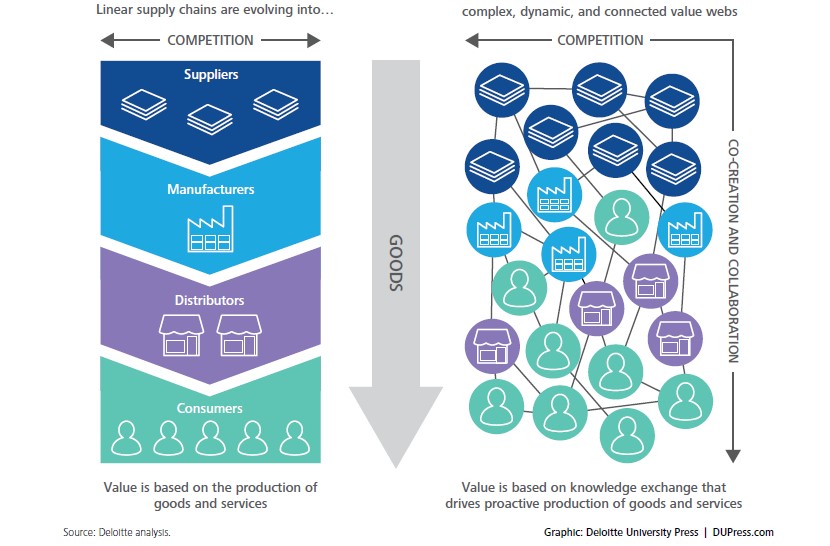
Progressive manufacturers are managing 80% or more of their supplier network activities beyond their own facilities, utilizing big data and cloud technologies to overcome the limitations of outdated Enterprise Resource Planning (ERP) and Supply Chain Management (SCM) systems. For manufacturers that rely on quick product lifecycles and fast operations, legacy ERP systems create obstacles. These systems, which were built for handling orders, shipments, and transactions, cannot adapt to the challenges that modern supply chains encounter.
Competing on accuracy, speed, and quality pushes supplier networks to achieve a level of understanding that old ERP and SCM systems can’t provide. Although many businesses haven’t yet integrated big data into their supply chain processes, these ten factors combined will drive many to start their journey.
The ten ways big data is revolutionizing supply chain management include:
- The scale, scope and depth of data supply chains are generating today is accelerating, providing ample data sets to drive contextual intelligence. The following graphic provides an overview of 52 different sources of big data that are generated in supply chains Plotting the data sources by variety, volume and velocity by the relative level of structured/unstructured data, it’s clear that the majority of supply chain data is generated outside an enterprise. Forward-thinking manufacturers are looking at big data as a catalyst for greater collaboration. Source: Big Data Analytics in Supply Chain Management: Trends and Related Research. Presented at 6th International Conference on Operations and Supply Chain Management, Bali, 2014
- Enabling more complex supplier networks that focus on knowledge sharing and collaboration as the value-add over just completing transactions. Big data is revolutionizing how supplier networks form, grow, proliferate into new markets and mature over time. Transactions aren’t the only goal, creating knowledge-sharing networks is, based on the insights gained from big data analytics. The following graphic from Business Ecosystems Come Of Age (Deloitte University Press) (free, no opt-in) illustrates the progression of supply chains from networks or webs, where knowledge sharing becomes a priority.
- Big data and advanced analytics are being integrated into optimization tools, demand forecasting, integrated business planning and supplier collaboration & risk analytics at a quickening pace. These are the top four supply chain capabilities that Delotte found are currently in use form their recent study, Supply Chain Talent of the Future Findings from the 3rd Annual Supply Chain Survey (free, no opt-in). Control tower analytics and visualization are also on the roadmaps of supply chain teams currently running big data pilots.
- 64% of supply chain executives consider big data analytics a disruptive and important technology, setting the foundation for long-term change management in their organizations. SCM World’s latest Chief Supply Chain Officer Report provides a prioritization of the most disruptive technologies for supply chains as defined by the organizations’ members. The following graphic from the report provides insights into how senior supply chain executives are prioritizing big data analytics over other technologies.
- Using geoanalytics based on big data to merge and optimize delivery networks. The Boston Consulting Group provides insights into how big data is being put to use in supply chain management in the article Making Big Data Work: Supply Chain Management (free, opt-in). One of the examples provided is how the merger of two delivery networks was orchestrated and optimized using geoanalytics. The following graphic is from the article. Combining geoanalytics and big data sets could drastically reduce cable TV tech wait times and driving up service accuracy, fixing one of the most well-known service challenges of companies in that business.
- Big data is having an impact on organizations’ reaction time to supply chain issues (41%), increased supply chain efficiency of 10% or greater (36%), and greater integration across the supply chain (36%). The Big Data Analytics in Supply Chain: Hype or Here to Stay? Accenture Global Operations Megatrends Study found that companies are achieving significant results using big data analytics to improve supply chain performance and gain greater contextual intelligence.
- Embedding big data analytics in operations leads to a 4.25x improvement in order-to-cycle delivery times, and a 2.6x improvement in supply chain efficiency of 10% or greater. Accenture found that embedding big data into supply chain operations accelerates supply chain processes a minimum of 1.3x over using big data on an ad hoc basis. Source: Big Data Analytics in Supply Chain: Hype or Here to Stay? Accenture Global Operations Megatrends Study
- Greater contextual intelligence of how supply chain tactics, strategies and operations are influencing financial objectives. Supply chain visibility often refers to being able to see multiple supplier layers deep into a supply network. It’s been my experience that being able to track financial outcomes of supply chain decisions back to financial objectives is attainable, and with big data app integration to financial systems, very effective in industries with rapid inventory turns. Source: Turn Big Data Into Big Visibility.
- Traceability and recalls are by nature data-intensive, making big data’s contribution potentially significant. Big data has the potential to provide improved traceability performance and reduce the thousands of hours lost just trying to access, integrate and manage product databases that provide data on where products are in the field needing to be recalled or retrofitted.
- Increasing supplier quality from supplier audit to inbound inspection and final assembly with big data. IBM has developed a quality early-warning system that detects and then defines a prioritization framework that isolates quality problem faster than more traditional methods, including Statistical Process Control (SPC). The early-warning system is deployed upstream of suppliers and extends out to products in the field.







